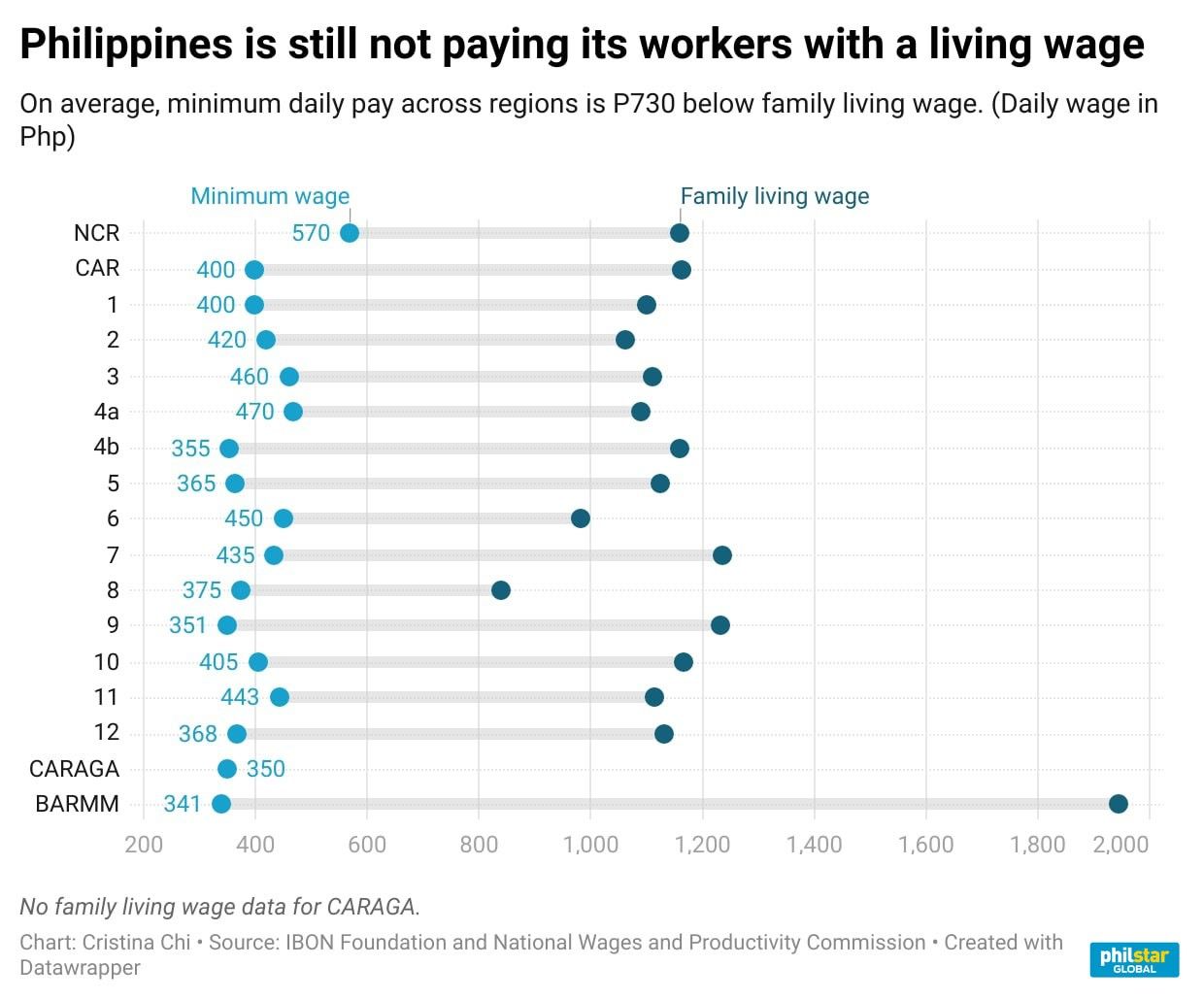P750 hike in daily wages for private sector workers sought

MANILA, Philippines – A bill seeking to increase the daily wage of private sector workers to meet a family living wage has been filed in the House of Representatives.
Makabayan bloc lawmakers, led by Rep. Arlene Brosas (Gabriela Women’s Party), filed House Bill 7568 on Monday mandating all employers in the private sector to pay their workers an additional P750 in daily wages across the board to allow households to ride the costs of surging inflation.
In the explanatory note, the measure acknowledged that while the minimum salary rate across all regions has “increased by hesitant small steps” through the creation of regional wage boards, workers’ minimum wages have failed to keep up with the soaring prices of basic goods and services.
Raising salary rates across all industries in the private sector by P750 would address the gap between workers’ wages and the rising cost of living, Brosas said in a statement.
“This yawning average minimum wage-family living wage gap of P750 across regions starkly represents the vast sea of unfulfilled basic necessities of ordinary Filipino families which the national government should urgently address through substantial wage increases,” she said.
Family living wage
The measure set the ballpark figure of P750 based on estimates by economic thinktank IBON Foundation that this amount would bridge the gap between workers’ current minimum wages and the estimated family living wage – or the minimum family income needed to provide for basic needs and a decent standard of living.
In February, IBON Foundation estimated that each family would need around P842 to P1,944 to provide for all expenditures and keep a standard of living above subsistence level.
In comparison, the current daily minimum wage rate per region ranges from P306 to P570.
IBON computes the current family living wage by adjusting the standard set by the National Wages and Productivity Commission (NWPC) in 2008 for inflation, according to IBON executive director Sonny Africa in an interview with GMA News’ Unang Balita in November.
“According to think tank IBON Foundation, the P570 minimum wage in Metro Manila, the highest regional minimum wage in the country, is only 49.1 percent of the P1,161 family living wage in the region as of January 2023,” the explanatory note stated.
A Philstar.com analysis of data from the IBON Foundation and the NWPC shows that across all regions, the median gap (most recurring value not skewed by extremes) between the minimum wage and IBON’s estimated family living wage is at P730.

'Higher wages won’t lead to inflation'
Among the bills currently pending at the committee level related to private sector workers’ minimum wages, HB 7568 is the only measure to include in its explanatory note that hiking wages would not lead to further price inflation.
“We have to counter the argument that wage hikes are inflationary. Various economists have already said this to be false. On the contrary, increasing wages has a strong economic multiplier effect,” the measure stated.
It added that low-income workers tend to spend more of what they earn compared to other workers because they are “starting from low levels of consumption.”
A large portion of their income is also expected to go to small businesses and informal enterprises in their communities, “spurring local economic activity which helps small businesses and induces job generation,” the measure stated.
The explanatory note also argued that increasing the purchasing power of low-income families, who typically spend more on food, will lead to increased spending on food and ramp up “economic activity in the countryside.”
“This will bring direct and concrete relief not just to millions of minimum wage earners but also to workers in other wage classifications, and will be largely felt even by non-wage earners due to the wage hike’s multiplier effect,” the bill stated.
The House subcommittee on labor standards will discuss on Wednesday measures seeking to increase workers' salaries by P150 daily across the board, among other measures. Bills on private sector workers’ minimum wages have been pending at the committee level since 2022.
Arguments against hiking the minimum wage from the business sector have previously mentioned that small-to-medium enterprises would struggle to shoulder the larger overhead costs that come with salary increases.
Brosas said that the measure would address this by requiring the government to subsidize significant salary increases to help small businesses comply.
Wage hike over Cha-Cha
Minority lawmakers opposing the constitutional convention bill supported by the House supermajority have argued that lawmakers should prioritize workers’ wages and act speedily to pass its related measures instead.
Based on initial estimates by Rep. Rufus Rodriguez (Cagayan de Oro), chair of the constitutional amendments committee, the government will need to spend at least P9.5 billion to pull off the constitutional convention model prescribed in the House bill, which is expected to get an overwhelming majority vote on final reading.
“Significant wage increase is long overdue. Instead of addressing Charter Change, the government should make (increasing) workers’ salaries their priority to address the worsening crisis in our country,” Brosas said in Filipino.
- Latest
- Trending





























